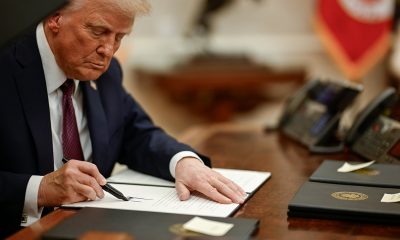Opinions
Pelosi should retire as Speaker
Democratic elder statesmen must help younger leaders succeed
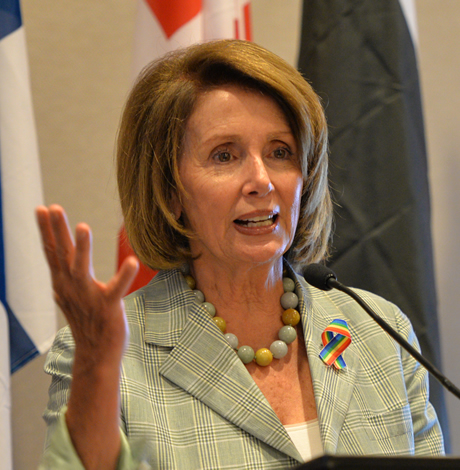
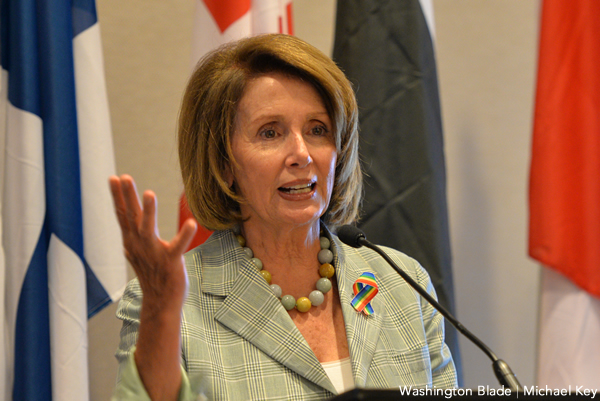
House Minority Leader Nancy Pelosi (D-Calif.) (Washington Blade file photo by Michael Key)
The goal of all Democrats in 2018 should be to see Nancy D’Alesandro Pelosi (D-Calif.) have the opportunity to announce she won’t run again in 2020 after getting sworn in as Speaker of the House of Representatives in January 2019.
Pelosi is a force of nature and politician extraordinaire. She grew up in a political family in Baltimore, her dad first serving in Congress and then becoming a three-term mayor.
She was elected to Congress in her own right from San Francisco in 1986. Since that time she has fought the good fight for liberal/progressive causes and in 2007 was elected Speaker making her the highest-ranking woman politician in American history. When Republicans took over the House in the 2010 elections Pelosi was elected Minority Leader. Now Democrats have the chance to make her speaker again.
In a June 2017 New York Times column it was reported “Since entering the House Democratic leadership in 2002, Ms. Pelosi has raised nearly $568 million for her party. Just in the 2016 election cycle, she raised over $141 million.” The column went on to say “her allies say she supplies much more than cash, praising her ability to impose member discipline and her skills as a “back-room dealer,” in the admiring words of Representative Dina Titus, Democrat of Nevada. Representative Steve Cohen, Democrat of Tennessee, hailed her deftness at “herding cats.” It’s been a lot of work for her to kind of keep us away from impeachment and on health care and the economy,” Mr. Cohen said.
So whatever the negatives of having Nancy Pelosi as a focal point for Republicans to criticize and use in their ads, in the long run Democrats have benefitted from having Pelosi as their leader. It seemed to many she was grooming Chris Van Hollen (D-Md.) to take over but he decided to run for the Senate in 2016 and is now the junior senator from Maryland. Senate Minority leader Chuck Schumer (D-N.Y.) actually waited until he was sworn in to name him chair of the Democratic Senatorial Campaign Committee (DSCC) based on the work he did as chair of the Democratic Congressional Campaign Committee (DCCC) and the trust Pelosi put in him.
Pelosi is working to ensure Democrats take back the House in the 2018 mid-term elections. She is also walking a tightrope on dealing with the issue of sexual harassment in Congress. She named Ben Ray Lujan (D-N.M.) as DCCC chair and they elected five vice chairs at the beginning of 2017 to help recruit candidates and set the message for the 2018 election cycle. Vice chairs include Reps. Joseph P. Kennedy III (D-Mass.), A. Donald McEachin (D-Va.), Betty McCollum (D-Minn.), and Jared Polis (D-Colo.) who is now running for governor of Colorado, and Ted Lieu (D-Calif.).
Last year ended with big wins for Democrats in New Jersey, Virginia, Alabama and victories in races across the country from county council to state legislatures. So Democrats who are clamoring for Pelosi to step down now should stop those efforts and focus all their energy on winning not only the House and Senate, but governorships, and legislatures across the nation.
Pelosi is smart enough to stay out of races where her name is a negative. Her skill at fundraising and her ability to keep Democrats together in the year leading up to the mid-term elections in November clearly outweigh any negatives attributed to her.
Democrats need to stop the infighting for the next year and instead work together to win. Stop all the speculation about who will be our Presidential candidate in 2020 and focus all our energies on 2018. If we can win the House, maybe even the Senate, and some governorships the field of candidates vying for what will be a valuable nomination will be large and include many of the names we know and some we don’t know yet.
So let’s focus on making Pelosi speaker in January 2019 at which time surely she will see the wisdom in announcing it will be her last term in Congress. Then maybe some of our other respected elder statespersons will follow suit and recognize it’s time for a new generation of Democrats to take center stage. The elder statespersons in the Party should put their egos aside and use their experience and wisdom to help the next generation of Democrats succeed.
Peter Rosenstein is a longtime LGBT rights and Democratic Party activist. He writes regularly for the Blade.
Opinions
My existence as an intersex American was finally acknowledged, then erased four days later
Federal government now defines sex as ‘male’ and ‘female’

In 2022, on an oppressively hot and humid day in June, I stood in line with others outside a White House security entrance, sweating but excited to attend former President Joe Biden’s Pride celebration. It was my first time, and I was thrilled to receive an invitation as an intersex activist.
President Biden, with First Lady Dr. Jill Biden at his side, took the small stage in the East Room of the White House. He welcomed the group of lesbian, gay, bisexual, transgender, intersex, and queer (LGBTIQ) activists assembled to hear his words and celebrate Pride. What happened next was a moment I will never forget. To my surprise, in his speech, the President said the word “intersex.” I looked at my intersex friends, who were tightly huddled next to me in the crowd as we stretched our necks to see over the people standing in front of us to catch a view of the president, and we shared a look that implied, “Did he really just say it?!” Here was arguably the most powerful person in the world, acknowledging our existence and right to a life free from discrimination and harm. The president went on to announce his Executive Order on Advancing Equality for Lesbian, Gay, Bisexual, Transgender, Queer, and Intersex Individuals, mandating, among other things, the creation of a report on good practices for advancing health equity for intersex individuals by the U.S. Department of Health and Human Services (HHS).
“Intersex” refers to the more than five million Americans with innate physical variations of sex anatomy that don’t align with typical notions of either a female or male body. Whether we choose to use the intersex label or not, as individuals with atypical physical sex characteristics, we have grown accustomed to being ignored or erased despite our public calls to decision-makers that we not be left behind.
Two and a half years after Biden recognized intersex people’s existence in that packed White House room, on Jan. 16, 2025, the last Thursday of Biden’s mandate, the administration released the long-awaited HHS report titled Advancing Health Equity for Intersex Individuals. The report is the product of many months of listening sessions with intersex people, advocates, and healthcare providers about their expertise and lived experiences. It aims to increase awareness about the harms of some current medical practices and to bring together policymakers, healthcare providers, intersex advocates, families, and community leaders to work in partnership to improve healthcare for intersex people across their lifespan. While nonbinding, it is truly a historic acknowledgment of the many long-standing intersex health disparities supported by evidence.
The groundbreaking report represents the first-ever U.S. government publication that fully acknowledges intersex people’s existence and the specific discrimination and harm we suffer and provides recommendations for change. On the same day, the U.S. Administration for Children and Families (ACF) issued an official Information Memorandum guiding on Improving Services and Outcomes for Intersex Children and Adolescents and their Families to make family and social services intersex-affirming. The recommendations aim to reduce distress and stigma for intersex youth and families and facilitate access to much-needed support.
These two documents released by HHS gave me a rare sense of validation and hope for the future.
Then, just four days later, on a Monday, his first day in office, newly sworn-in President Trump signed an executive order that officially erased my existence. The misleadingly titled “Defending Women from Gender Ideology Extremism and Restoring Biological Truth to the Federal Government” states that it is U.S. policy to define “sex” as “an individual’s immutable biological classification as either male or female.” It further defines “female” as someone who produces eggs and “male” as someone who produces sperm. However, my intersex body, like the bodies of many intersex people, does not produce either gametes, arguably leaving us in legal limbo.
The stark contrast between administrations in relation to intersex rights is both mind-blowing and devastating. The probable purpose of Trump’s executive order is to whip up moral panic around the existence of trans people, but its blow no less impacts intersex people.
The majority of intersex individuals identify with either the male or female sex and may have a range of gender identities. I consider myself an “intersex woman” assigned female at birth despite my XY chromosomes and lack of internal female reproductive organs. I was actually born with internal testes that, despite being healthy hormone-producing gonads, were removed as a child without my knowledge or even my parents’ informed consent. Unfortunately, my experience is not unique, and this attempt to erase our intersex traits causes much physical and emotional harm over a lifetime. It is an example of the harmful practices and health inequities that the new HHS report evidences.
Under Trump’s executive order, things will get even worse for intersex people. My government documents currently reflect my female gender identity, but under this executive order, I could presumably be forcibly categorized as “male”: “a person belonging, at conception, to the sex that produces the small reproductive cell. The Trump administration has already taken down the groundbreaking HHS report.
Today, lesbian, gay, bisexual, transgender, intersex, and queer (LGBTIQ) people the world over are struggling with the many devastating statements and orders given by President Trump, and I stand in solidarity with the entire rainbow community. We all experience discrimination and harm based on other’s misconceptions, fears, and biases. Intersex people, like trans and nonbinary people, and like queer women and men, specifically share the everyday fight for bodily autonomy. At moments like this, when we are under attack, it is all the more important that the rainbow community also stands in solidarity with us. So far, though, that hasn’t been my experience. On Monday, the same day President Trump ordered the erasure of my existence, a prominent publication published an article highlighting a long list of former President Biden’s “top pro-LGBTQ+ actions,” yet neglected to include the groundbreaking HHS Report on Advancing Intersex Health Equity. It seemed like the intersex community was erased yet again that day.
As our broader rainbow community faces new hurdles, we must do better. The “I” should not stand for “invisible.” Now, more than ever, our communities need to stand together in resistance — and it starts with acknowledging our existence.
Kimberly M. Zieselman, JD, is an intersex woman and the Senior Advisor for Global Intersex Rights at Outright International. She is also the former executive director of interACT: Advocates for Intersex Youth and a former U.S. State Department Senior Advisor to the Special Envoy to Advance the Human Rights of LGBTQI+ Persons. Her award-winning memoir, “XOXY”, was published in 2020.
Opinions
US under Trump no longer stands for human rights, decency
LGBTQ people dependent upon American foreign aid may not survive

MEXICO CITY — Then-President Donald Trump on July 16, 2018, defended Russian President Vladimir Putin during a press conference that took place in Helsinki after they met. I watched it happen on live television while I was on assignment in Mexico City. This disgusting spectacle prompted me to write an op-ed about how the U.S. no longer stood for human rights around the world.
I am once again on assignment in Mexico City, 15 days after Trump returned to the White House. He is doing everything possible to ensure the U.S. will no longer stand for human rights — around the world and in our own country — and basic decency.
Trump’s executive orders have, among other things, threatened the lives of an untold number of LGBTQ people around the world who depend upon U.S. foreign aid to survive. These directives have systematically erased transgender, nonbinary, and intersex Americans. Trump has also antagonized Mexico, Canada, and other U.S. allies with his ridiculous tariff threats.
One may have naively thought that Trump would have shown an ounce of decency with his response to last week’s tragic midair collision near Reagan National Airport. Trump instead suggested, without evidence, that previous administrations’ diversity, equity, and inclusion policies could have caused it.
I thankfully did not watch Trump the comments and defense of them. I did, however, have a very undiplomatic response when I read them while I was at a coffee shop near my hotel in Tijuana.
“Shut the fuck up,” I said out loud.
I wrote after Trump defended Putin in Helsinki that American exceptionalism, however flawed, “teaches us the U.S. is the land of opportunity where people can build a better life for themselves and for their families.”
“Trump has turned his back on these ideals,” I concluded. “He has also proven himself to be a danger, not only to his country but to the world as a whole.”
History is sadly repeating itself.
Opinions
Trans women: Abuse in Colombia, rejection in U.S.
U.S. has a moral and legal obligation to provide refuge
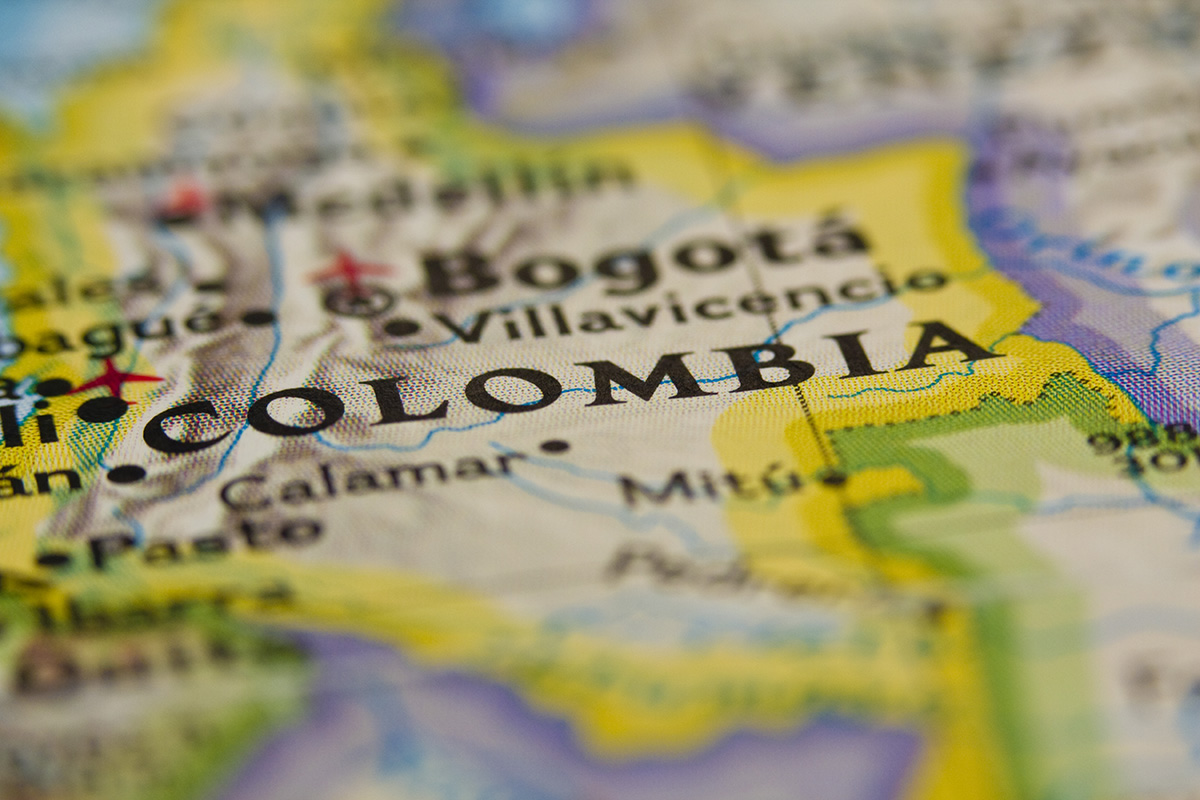
I teach International Human Rights and U.S. Asylum law. I have traveled with students to Colombia and met with one of the most vulnerable marginalized communities – trans women. We learned about their constant threats, fear, and trauma. Social stigma, lack of government supported healthcare, employment exclusion and discrimination, and violent hate crimes, push many trans women to flee their homes, even their parents’ homes, in search of safety and dignity.
Yes, some Colombian legal protections for LGBTQ communities exist, such as the decriminalization of same-sex relationships and recognition of gender identity. However, the state’s failure to effectively enforce these laws, forces many trans women to leave.
And in our own backyard, Trump administration executive orders on (not) providing refuge, closing the border, and on (not recognizing) trans individuals will result in their continuing persecution.
They hope that by leaving Colombia, often risking their lives for the possibility of asylum, they will have a better future. The journey north is dangerous — natural, legal, and man-made challenges confront trans women as they try to cross through Central America by bus, foot, or truck. Central American countries like Panama, Costa Rica, and Nicaragua, pose legal, political, economic, and transphobic challenges.
The passage through Central America is not just a political or bureaucratic challenge, but a physical one with extreme risks. Trans women often travel in disguise or attempt to blend in with other migrant groups, but their gender identity inevitably makes them vulnerable to sexual violence, exploitation, and even murder. Criminal organizations that prey on migrants see trans women as easy targets for extortion and trafficking. Alongside physical danger, they must navigate a maze of legal barriers. Central American governments’ reluctance to acknowledge gender-based persecution means many trans women do not receive the protection they would otherwise qualify for under international refugee laws.
Yet once they reach the U.S. border, they face a series of almost impossible legal and procedural hurdles. Many are detained in border facilities where the risk of abuse, including sexual assault and mistreatment by law enforcement, is significant, and they must secure competent legal representation. Immigration law in general, and asylum law specifically, is unbelievably complex. The Application for Asylum is 12 pages long, in English. There is no right to government-supported free legal aid, unlike the availability of public defenders for people charged with crimes. Trans women often struggle to find lawyers who are knowledgeable about the asylum procedures and how to prove persecution because of gender identity. Those who do manage to secure legal aid face an overcrowded, understaffed immigration system that can take years to process asylum applications, during which time they remain in a state of limbo.
This process involves telling their story before an asylum officer or an immigration judge, perhaps the most emotionally taxing part of the process. For many trans women, recounting their experiences of violence and discrimination in their home countries is not just a legal procedure, but an emotionally traumatic reenactment. Asylum officers and immigration judges may lack training in trans issues, sometimes fail to recognize the nuances of gender identity and violence, resulting in re-traumatization and the denial of claims that deserve protection under both U.S. and international human rights laws. If denied asylum, they need to file a written appeal within 10 days to an administrative appeals unit. And if they lose there, they can file an appeal to the U.S Court of Appeals where they reside.
Between 2014 and 2024, data shows that the overwhelming majority of appeals from trans asylum applicants were filed by Latinx individuals. Of the 25 applicants, 20 were from Latin America, with Mexico, Honduras, and other Central American countries representing the bulk of petitioners. Most circuit courts denied the appeals, but the Ninth (covering California) and Tenth Circuit (covering Colorado and New Mexico) were most favorable to petitioners. Notably, there was no representation of Colombian nationals in this data. This absence, however, does not mean that trans women from Colombia were not seeking asylum. Instead, it could reflect numerous barriers, such as being denied by an immigration judge without appealing process, fear of repercussions, language barriers, lacking resources to afford legal counsel, or insufficient knowledge of the appeals.
The stakes could not be higher. For trans women from Colombia and other countries, asylum in the United States is not just about securing a new life, but escaping a nightmare of systemic violence and oppression.
As a society, we must do more than merely acknowledge these challenges; we must address them directly. Colombia must recognize the rights of all of its people, including trans women, and equally important, implement those laws by charging, investigating and sentencing the perpetrators of human rights abuses against trans women. The U.S. can withhold foreign aid for failure to comply with the Leahy Principles, which prevents the U.S. from providing foreign aid to governments with poor human rights records.
We have a moral and legal obligation to provide refuge given that we passed the U.S. Refugee Act as far back as 1980. This means ensuring that their voices are heard, their experiences are validated, and that the asylum process is accessible and protects their rights. Without these changes, the cycle of violence and displacement will continue, leaving countless trans women in danger and without hope for the future.
Fernando Chang-Muy is the Thomas O’Boyle Lecturer in Law at the University of Pennsylvania. Ashley Acosta is a junior at the University of Pennsylvania majoring in Political Science with minors in Legal Studies & History, Sociology, and Latin American and Latinx Studies.
-

 State Department4 days ago
State Department4 days agoTransgender people removed from State Department travel page
-
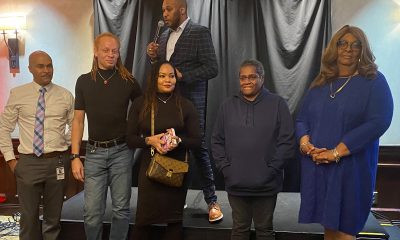
 District of Columbia5 days ago
District of Columbia5 days agoD.C. Black Pride announces 2025 theme of ‘Freedom’
-

 Real Estate2 days ago
Real Estate2 days agoNavigating D.C.’s down payment assistance programs
-
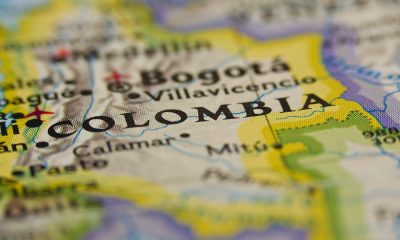
 Opinions5 days ago
Opinions5 days agoTrans women: Abuse in Colombia, rejection in U.S.

